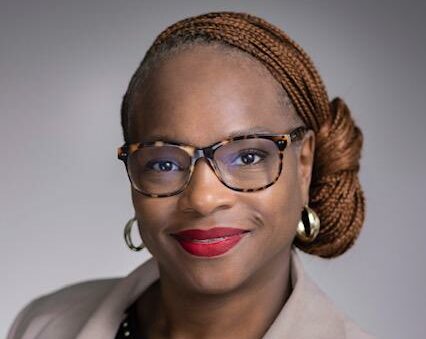
- Kim Kisner
- Community
- 11/14/2023
Commissioner Monique Baker McCormick’s Goals Include Reducing Carbon Footprint

In 2022, Monique Baker McCormick was re-elected for her third term as Wayne County Commissioner of District 6. She serves Redford Township and Northwest Detroit in the community where she grew up.
SBN Detroit spoke to McCormick about the sustainability initiatives she’s been involved in and how they impact residents and businesses in her community.
Q: How does sustainability integrate with your position and the work you do as a Wayne County Commissioner?
A: I think elected officials must support our communities and in doing so we need to protect the environment and quality of life for today and for future generations.
Q: You are involved in so many committees and initiatives, can you give a couple of examples of how sustainability comes into play?
A: We recently received a $1.1 million grant to create Wayne County resiliency hubs to reduce our carbon footprint in Wayne County.
When I became the chair of Health and Human Services, I became involved with the toxic waste coming from Ohio to Wayne County following a train derailment. This is an environmental issue, a human rights issue, and a civil rights issue, and impacts the quality of life for all of us.
As a commissioner, I don’t dig into how cities manage their environmental programs, but I can help on a county level to get funds and to help with programming necessary for the communities. Within the Economic Development Committee, we do have more say in how the operation of sustainability of Wayne County unfolds and how the resiliency hubs work as well.
Q: How does this work impact businesses in your district?
A: I think the work we do to reduce our carbon footprint and improve the quality of life in Wayne County impacts all of our citizens and businesses and will only help them grow and flourish. I think it helps to drive new businesses to the county as well.
Q: You created the Wayne County Commission Youth Council (WCCYC). What is the impetus behind this?
A: I had a long journey to becoming a commissioner. I started as a young Democrat and worked for the Democratic party and began to see first-hand how our democracy works and also how it does not. I want the next generation of leaders to understand that if you don’t fight for something, have a voice, or don’t have a seat at the table then don’t expect that someone is going to fight for you. If you want to see change in your community change starts from the bottom up, and that means all of us getting involved in the process.

The Wayne County Commission Youth Council helps young people understand this and empowers them to get involved in the process. The goal is to take youth from varied socioeconomic backgrounds and multicultural neighborhoods and help them become socially responsible community members.
They pick their topics. We have worked on gun reform, mental health in schools, economic oppression, and more. They do voter registration and outreach, community service, and other issues. We travel to Lansing to meet legislators to make their voices heard regarding what they want to see change in Wayne County.
Q: Do you think the youth that are involved now will have an impact on Southeast Michigan businesses as they join the workforce?
A: One girl comes to mind – a tenth grader who was an introvert who did not want to speak in meetings at first. She didn’t know she had a voice. She evolved and eventually became the Youth Council President, speaking at all of the meetings and doing interviews, etc. Now she knows she can use her voice for change and for good.
Another former member is now the president of his college council on campus.
The program also has an internship component. One of our members worked for the mayor’s office in Northville. They go on to do the work that we start.
Q: You have led efforts to mitigate foreclosures and increase African-American homeownership. How does this tie to sustainability regarding developing communities and the economy?

A: The sustainability of Black and Brown communities starts with the American dream of home ownership. With home ownership you build equity. You buy a home and the value increases over time and once that increases you have this equity. But we’ve seen generations of wealth that have started with home ownership to then be wiped out by freeways. This causes generational economic oppression. It’s difficult to sustain a quality of life when you are always starting behind.
Since 2008, African American home ownership is back down to the levels it was in the late ‘60s and early ‘70s all over the country. Detroit has more renters now whereas years ago there were more homeowners. We have to be intentional about how we address this. There are still redlining issues. There is still a lack of ability to get loans. There are a lot of issues around trying to get back to where were.
Q: What is the war on trash that you initiated?

A: This is an anti-littering campaign. It’s about advocacy that pushes the government and the community to do the right things around trash and littering.
When we started the campaign, one of the first issues to address was to ensure our community had trash cans. I worked with the city of Detroit and the Downtown Detroit Partnership to purchase 50 trash cans and enlisted community volunteers to put the cans at city entry points, bus stops, etc.
We partnered with elementary schools to try to embed early on that if you live in a community, you should be proud of that community and help to keep it clean. Our messages of “Love Where You Live” and “Don’t Stop and Drop” prompted kids to create art projects around clean communities, maintained trash around their schools, and more.
It’s pushing to keep communities clean and green because there is more trash, there is more crime.
Q: How do you think your efforts in improving the quality of life in your district impact the businesses and the communities overall?
A: I think people see what we are doing. You can see the war on trash working. Businesses appreciate that they have a clean environment around their buildings. I think it increases economic development.
Be sure to subscribe to our newsletter for regular updates on sustainable business practices in and around Detroit.
Kim Kisner
- All
- Business
- Community
- Education
- Events

Unique Monique Scented Candles, a Detroit-based business founded by Monique Bounds., aims to produce candles and household products with clean ingredients and local supply chains. What began as a personal hobby during college has evolved into a full-time venture producing coconut oil and soy-based candles made with essential oils and locally sourced materials. SBN Detroit interviewed Bounds about launching a sustainable product line, sourcing challenges in Michigan, and...

Eastern Market Partnership, in collaboration with the City of Detroit’s Office of Sustainability Urban Agriculture Division, has announced $240,000 in grant funding to support Detroit-based farmers and farmer collectives. The grants will advance food access, climate education, sustainable land use, and economic opportunity, with priority given to Black- and Indigenous-led farms, youth-led initiatives, and projects rooted in historically disinvested neighborhoods. The recipients – ranging from cooperatives and community...

Citizen Robotics is a Detroit-based nonprofit that advances the use of robotics and digital manufacturing in residential construction, focusing on improving productivity, sustainability, and long-term affordability. Best known for its early work in 3D-printed housing, it explores how alternative construction methods and new financial models can reduce material waste, lower lifetime operating costs, and enhance the resilience of homes. SBN Detroit interviewed Tom Woodman, founder and president of...







